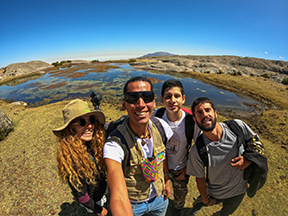To encourage collaboration between high school journalism and environmental science classes, we invite teachers to submit proposals for innovative class projects in which journalism students will report about field research by environmental science students. Our principal goals are:
- to help young prospective journalists better understand and explain to the public how science is done
- to help environmental science students learn to use the media to explain their work to the public.
- To promote environmental and science journalism.
The Knight Center intends to award 1-year grants of $2,000 to up to 3 high schools: $1,000 to the journalism program and $1,000 to the environmental science program for equipment, software or scholarships. In addition, the Knight Center will pair each school with a professional journalist to serve as a mentor to participating students and teachers.

 Located near the town of San Pedro de Casta in the province of Huarochirí, Lima, it is one of the highest plateaus in the world (4,100 meters above sea level), with 4 square kilometers of rock formations, spectacular abysses, lagoons, flora, fauna and a sky in which you can see the Milky Way.
Located near the town of San Pedro de Casta in the province of Huarochirí, Lima, it is one of the highest plateaus in the world (4,100 meters above sea level), with 4 square kilometers of rock formations, spectacular abysses, lagoons, flora, fauna and a sky in which you can see the Milky Way.